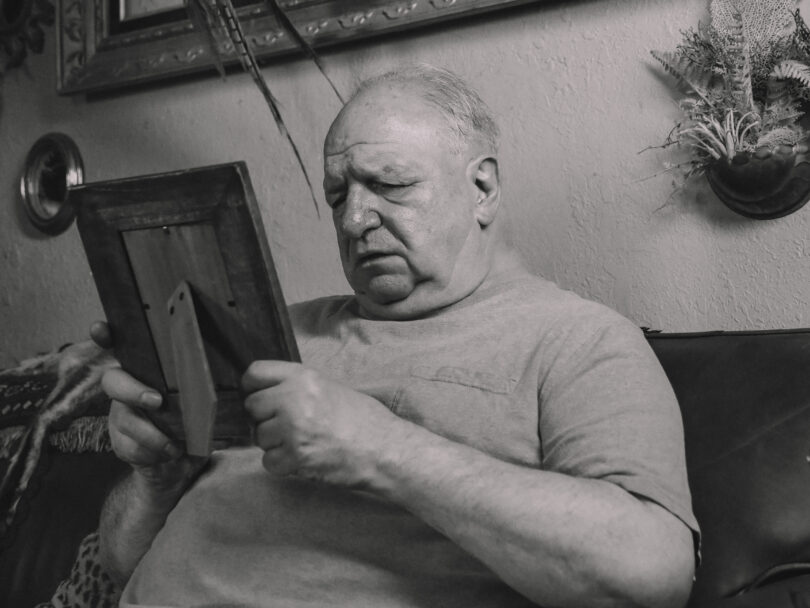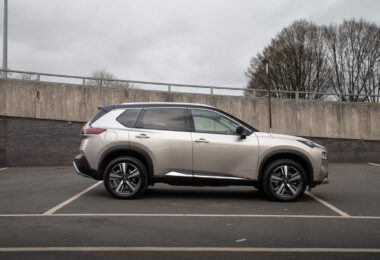At the time of his dad’s Parkinson’s diagnosis, 36-year-old George (not his real name) had a busy life working full time and parenting a lively three-year-old and a ten-month-old. He describes the first few years of his father’s Parkinson’s diagnosis as ‘relatively uneventful’. But when the pandemic hit, their lives significantly changed, as Tim Barnes-Clay reports.
I will never forget that phone call from my parents. My dad, a heavy-set man, called to tell me that he had fallen on top of my mum, breaking her hip.
When my mother was safe at the hospital, reality dawned on me. My parents had been keeping a secret from us. Cocooned away from the world, they had hidden their struggles, not wanting to cause concern to my heavily pregnant sister or me. My father’s Parkinson’s had worsened.
Over a prolonged period, my mum had lifted my dad in and out of bed every night, prepared meals, and cared for him alone with no outside support. They had silently managed as best they could. Now, ironically, respite for mum had come in the form of a hospital stay with a broken hip. It was now my turn to become the carer, something I had not previously considered.
In my first few days at my parent’s house, I discovered it was ill-equipped. There were no supports to help dad lift himself out of bed. Instead, mum had propped dad up with pillows to assist him on his two hourly toilet visits. Accessibility around the house was difficult, and dad’s lack of physical activity had furthered his decline in mobility.
Looking back at that time, it is a blur. I cared for my father, visited mum in the hospital, and saw my wife and kids in the free time I had left. So, naturally, I had to take leave from work. And as the weeks continued, I was forced to resign. Everything I had known changed, and there was no rule book on how to navigate it.
I was my dad’s sole carer for six weeks. My sister gave birth to her second child. The pandemic uncertainty continued, and my wife sole-parented our two young children. It was here that my mental health started to take a downturn. I called for help through the local authority but was directed to endless forms and paperwork.
In desperation, I used my savings to employ private carers, only to learn they were not insured to lift my dad at night. They gave me no respite. Or, more importantly, a good night’s rest. I was running on two to three hours of rest a night,
In sheer desperation, I suggested respite care to my dad. He point-blank refused and instead took to his riser reclining chair to sleep, hoping it would lift him without my support. I pleaded with him to return to the bed. After three nights, he began to develop fluid on his legs from sleeping in the chair. He was taken to the hospital, assessed, and promptly discharged. Not long afterwards, dad fell down the stairs. He was hospitalised and bedridden for two weeks, hugely impacting his health and mobility.
I knew I could not go on and refused to take dad home. He accused me of not ever having done anything for him. Any shred of patience that I had held onto for the past six weeks left me. I swore and walked away. I had left my job and home, putting my life on hold to care for him.
Now I see the anger we held was masking fear. This was a new territory for us both. Our relationship had changed incomparably. My father now relied on me, a young dad myself, to help him navigate a progressive condition that neither of us knew much about.
I needed a break to equip the house for both my parent’s return and to support my health. Eventually, my dad was taken to a rehabilitation centre, allowing me time to fit the house with a motorised bed, wall supports, and more.
It was only when my father struggled with episodes of Parkinson’s psychosis that he called upon me again, and we were reunited. I realise we needed the time apart to process the changes we both had been through. Today, we both agree that it was a journey, and the experience has changed my whole outlook on life.
Caring for my dad was a humbling experience. Despite that, I have gained his respect, and our relationship is stronger than ever. Through it, I have learned not to mourn the losses and made peace with dad’s diagnosis. I now celebrate what we have together. In addition, I try to help others by volunteering at a local Parkinson’s group and educating people on the condition.
I know today, as a father and son, we are where we are because of Parkinson’s, not despite it.
Parkinson’s is the fastest-growing neurological condition in the world, and currently, there is no cure. It affects around 145,000 people in the UK, and two more people are diagnosed every hour. There are over 40 symptoms, from tremors and pain to anxiety.
Parkinson’s UK has a range of information resources for people with Parkinson’s and their carers. In addition, support is available for everyone affected by Parkinson’s on the Parkinson’s UK website, www.parkinsons.org.uk and via the free, confidential helpline (0808 800 0303) and online forum.
Check out this article and loads more in our magazine.









Leave a Comment
You must be logged in to post a comment.